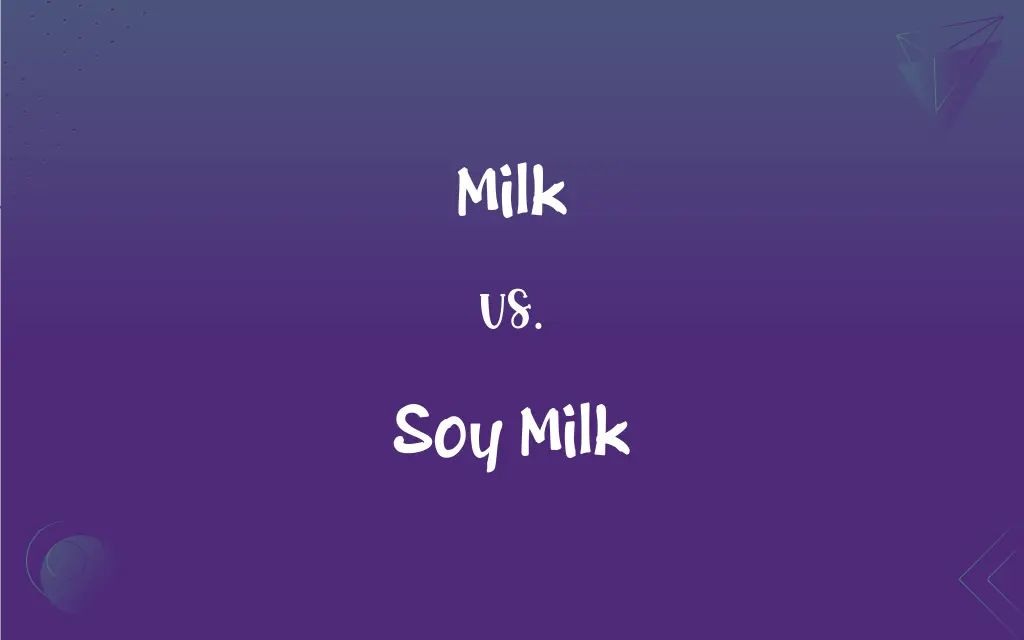Milk vs. Soy Milk: What's the Difference?
Edited by Harlon Moss || By Janet White || Published on March 12, 2024
Milk is a nutrient-rich fluid produced by mammals, primarily cows, while soy milk is a plant-based beverage made from soybeans, offering a dairy-free alternative.

Key Differences
Milk is a natural liquid produced by the mammary glands of mammals, such as cows, goats, and sheep, primarily used for feeding their young. Soy milk, on the other hand, is derived from soybeans, a legume, and is a popular non-dairy alternative to cow's milk.
In terms of nutritional content, cow's milk is rich in calcium, vitamin D, and protein, and contains lactose, a natural sugar. Soy milk, while also providing protein, is naturally lactose-free and often fortified with vitamins and minerals to mimic cow's milk's nutritional profile.
The taste and texture of cow's milk is creamy and varies from sweet to slightly salty, depending on the fat content. Soy milk has a distinctive, slightly bean-like taste and comes in various flavors and formulations to suit different preferences.
Milk is a key ingredient in many dairy products like cheese, yogurt, and butter. Soy milk is used as a substitute in vegan and lactose-intolerant diets, often found in plant-based versions of these dairy products.
Allergy and dietary considerations play a significant role in choosing between the two; cow's milk can cause lactose intolerance or milk allergies, while soy milk is a safe alternative for those conditions, though it may not be suitable for individuals with soy allergies.
ADVERTISEMENT
Comparison Chart
Source
Mammary glands of mammals
Soybeans
Nutritional Content
High in calcium, vitamin D, lactose
Lactose-free, often fortified with vitamins and minerals
Taste and Texture
Creamy, varies from sweet to slightly salty
Distinctive, slightly bean-like, available in various flavors
Common Uses
Dairy products like cheese, yogurt
Vegan alternatives to dairy products
Dietary Considerations
Lactose intolerance, milk allergies
Suitable for lactose intolerance, soy allergies concern
ADVERTISEMENT
Milk and Soy Milk Definitions
Milk
Milk is rich in calcium and protein, essential for bone health.
Children are encouraged to drink milk for strong bones.
Soy Milk
Soy milk is a plant-based beverage made from soybeans.
She switched to soy milk in her diet.
Milk
Milk is a white nutritious liquid produced by mammals.
She poured milk into her morning coffee.
Soy Milk
Soy milk is often fortified with vitamins and minerals.
Fortified soy milk provides essential nutrients like calcium and vitamin D.
Milk
Milk is used as a base in dairy products like cheese and yogurt.
They used fresh milk to make homemade yogurt.
Soy Milk
Soy milk is a popular dairy-free alternative to cow's milk.
Vegan recipes often use soy milk as a milk substitute.
Milk
Milk contains lactose, a natural sugar.
Lactose in milk can cause intolerance in some people.
Soy Milk
Soy milk is naturally lactose-free and suitable for vegans.
Lactose-intolerant individuals can safely consume soy milk.
Milk
Cow's milk is the most commonly consumed type.
Most supermarkets stock various types of cow's milk.
Soy Milk
Soy milk comes in various flavors, including vanilla and chocolate.
He enjoyed a glass of chocolate-flavored soy milk.
Milk
A whitish liquid containing proteins, fats, lactose, and various vitamins and minerals that is produced by the mammary glands of all mature female mammals after they have given birth and serves as nourishment for their young.
Milk
The milk of cows, goats, or other animals, used as food by humans.
FAQs
Can milk be consumed by vegans?
No, vegans do not consume animal products, including milk.
What is the main source of milk?
Milk is produced by the mammary glands of mammals, primarily cows.
Is soy milk suitable for lactose-intolerant individuals?
Yes, it's naturally lactose-free.
What is the main difference in taste between milk and soy milk?
Milk has a creamy and slightly sweet taste, while soy milk has a distinct, slightly bean-like flavor.
What are the nutritional benefits of soy milk?
It provides protein and is often fortified with calcium and vitamins.
Does milk naturally contain vitamin D?
Cow's milk is often fortified with vitamin D, but it’s not naturally high in it.
Is soy milk good for people with milk allergies?
Yes, it's a safe alternative for those with milk allergies.
Does milk have any dietary restrictions?
People with lactose intolerance or milk allergies should avoid it.
Can soy milk be used in cooking like regular milk?
Yes, it can be used in most recipes as a substitute for cow's milk.
Is soy milk higher in protein than cow's milk?
Soy milk has a comparable protein content to cow's milk.
Can milk be a part of a plant-based diet?
No, milk is an animal product and not considered part of a plant-based diet.
Is cow's milk environmentally sustainable?
Dairy farming has a significant environmental impact; plant-based alternatives like soy milk are generally more sustainable.
Is calcium in cow's milk more absorbable than in soy milk?
Calcium in cow's milk is highly bioavailable, but fortified soy milk also provides a good amount of absorbable calcium.
Does soy milk contain cholesterol?
No, soy milk is cholesterol-free.
Is soy milk more expensive than cow's milk?
The price varies, but soy milk can be more expensive than regular cow's milk.
Can soy milk cause allergies?
Yes, some individuals may be allergic to soy.
Can soy milk be used in baking?
Yes, it's a great substitute for milk in baking recipes.
Is organic milk healthier than regular milk?
Organic milk comes from cows not treated with antibiotics or hormones and fed organic feed, but nutritionally it's very similar to regular milk.
Can soy milk be homemade?
Yes, it can be made at home by soaking, grinding, and straining soybeans.
Is milk suitable for a low-fat diet?
Low-fat and skim milk options are suitable for a low-fat diet.
About Author
Written by
Janet WhiteJanet White has been an esteemed writer and blogger for Difference Wiki. Holding a Master's degree in Science and Medical Journalism from the prestigious Boston University, she has consistently demonstrated her expertise and passion for her field. When she's not immersed in her work, Janet relishes her time exercising, delving into a good book, and cherishing moments with friends and family.
Edited by
Harlon MossHarlon is a seasoned quality moderator and accomplished content writer for Difference Wiki. An alumnus of the prestigious University of California, he earned his degree in Computer Science. Leveraging his academic background, Harlon brings a meticulous and informed perspective to his work, ensuring content accuracy and excellence.






































































